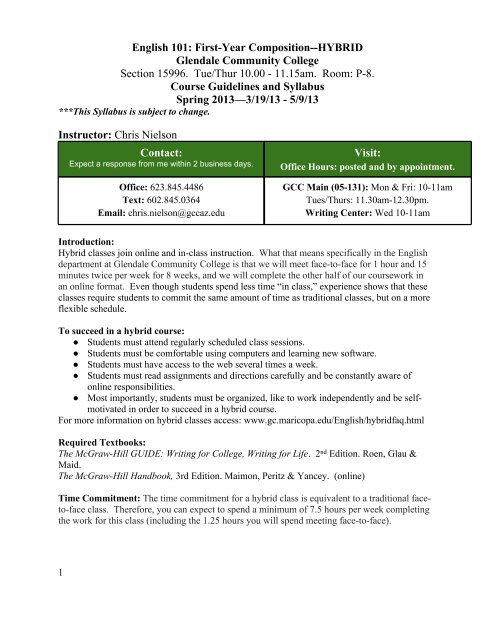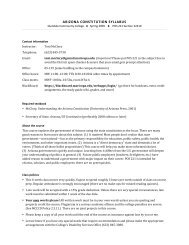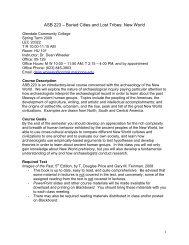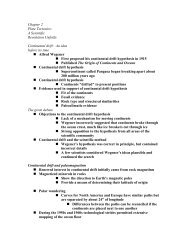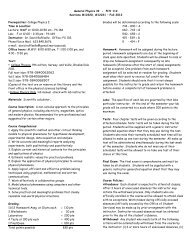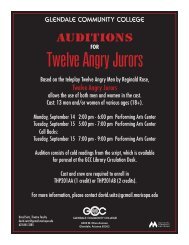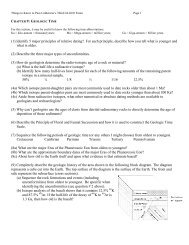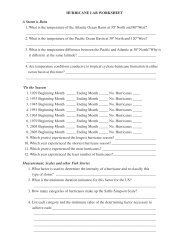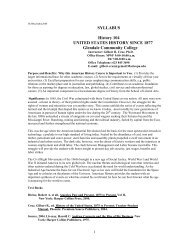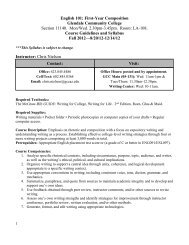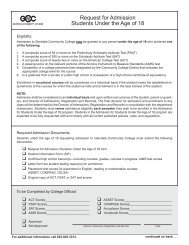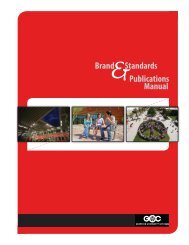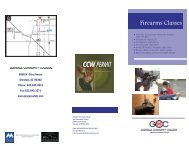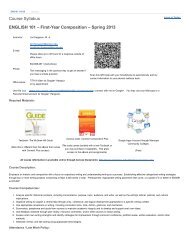English 101: First-Year Composition--HYBRID Glendale Community ...
English 101: First-Year Composition--HYBRID Glendale Community ...
English 101: First-Year Composition--HYBRID Glendale Community ...
You also want an ePaper? Increase the reach of your titles
YUMPU automatically turns print PDFs into web optimized ePapers that Google loves.
<strong>English</strong> <strong>101</strong>: <strong>First</strong>-<strong>Year</strong> <strong>Composition</strong>--<strong>HYBRID</strong><br />
<strong>Glendale</strong> <strong>Community</strong> College<br />
Section 15996. Tue/Thur 10.00 - 11.15am. Room: P-8.<br />
Course Guidelines and Syllabus<br />
Spring 2013—3/19/13 - 5/9/13<br />
***This Syllabus is subject to change.<br />
Instructor: Chris Nielson<br />
Contact:<br />
Expect a response from me within 2 business days.<br />
Office: 623.845.4486<br />
Text: 602.845.0364<br />
Email: chris.nielson@gccaz.edu<br />
Visit:<br />
Office Hours: posted and by appointment.<br />
GCC Main (05-131): Mon & Fri: 10-11am<br />
Tues/Thurs: 11.30am-12.30pm.<br />
Writing Center: Wed 10-11am<br />
Introduction:<br />
Hybrid classes join online and in-class instruction. What that means specifically in the <strong>English</strong><br />
department at <strong>Glendale</strong> <strong>Community</strong> College is that we will meet face-to-face for 1 hour and 15<br />
minutes twice per week for 8 weeks, and we will complete the other half of our coursework in<br />
an online format. Even though students spend less time “in class,” experience shows that these<br />
classes require students to commit the same amount of time as traditional classes, but on a more<br />
flexible schedule.<br />
To succeed in a hybrid course:<br />
● Students must attend regularly scheduled class sessions.<br />
● Students must be comfortable using computers and learning new software.<br />
● Students must have access to the web several times a week.<br />
● Students must read assignments and directions carefully and be constantly aware of<br />
online responsibilities.<br />
● Most importantly, students must be organized, like to work independently and be selfmotivated<br />
in order to succeed in a hybrid course.<br />
For more information on hybrid classes access: www.gc.maricopa.edu/<strong>English</strong>/hybridfaq.html<br />
Required Textbooks:<br />
The McGraw-Hill GUIDE: Writing for College, Writing for Life. 2 nd Edition. Roen, Glau &<br />
Maid.<br />
The McGraw-Hill Handbook, 3rd Edition. Maimon, Peritz & Yancey. (online)<br />
Time Commitment: The time commitment for a hybrid class is equivalent to a traditional faceto-face<br />
class. Therefore, you can expect to spend a minimum of 7.5 hours per week completing<br />
the work for this class (including the 1.25 hours you will spend meeting face-to-face).<br />
1
Course Description: Emphasis on rhetoric and composition with a focus on expository writing<br />
and understanding writing as a process. Establishing effective college-level writing strategies<br />
through four or more writing projects comprising at least 3,000 words in total.<br />
Prerequisites: Appropriate <strong>English</strong> placement test score or grade of C or better in ENG091/<br />
ESL097.<br />
Course Competencies:<br />
1. Analyze specific rhetorical contexts, including circumstance, purpose, topic, audience,<br />
and writer, as well as the writing’s ethical, political, and cultural implications.<br />
2. Organize writing to support a central idea through unity, coherence, and logical<br />
development appropriate to a specific writing context.<br />
3. Use appropriate conventions in writing, including consistent voice, tone, diction,<br />
grammar, and mechanics.<br />
4. Summarize, paraphrase, and quote from sources to maintain academic integrity and to<br />
develop and support one’s own ideas.<br />
5. Use feedback obtained through peer review, instructor comments, and/or other sources to<br />
revise writing.<br />
6. Assess one’s own writing strengths and identify strategies for improvement through<br />
instructor conference, portfolio review, written evaluation, and/or other methods.<br />
7. Generate, format, and edit writing using appropriate technologies.<br />
In order to meet these competencies, you should be prepared to write. We will be exploring<br />
how to use writing as a tool for thinking and discovering. Therefore, I will be looking at what<br />
you write on the way to completed papers along with the finished product. This course will also<br />
require you to do a lot of reading, because writing well is connected to reading. We will talk<br />
about the writing process and explore techniques for getting started, finding topics, drafting,<br />
researching, organizing, revising, responding to other writers’ work in progress, and editing.<br />
This course will not only help you become a more proficient writer, it will also enable you<br />
to develop your critical reading and analytical skills. We will practice different methods of<br />
responding to texts, using writing as a means for deepening comprehension. Be prepared to<br />
mark in your book (you bought it—it is yours—so you can write in it without consequence).<br />
Public Work: This semester, you will complete three (3) major writing projects, plus informal<br />
writing assignments, in-class and online work, and a blog. Please keep in mind that all of your<br />
writing will be considered ‘public.’ Thus, you will share your work, including drafts, with<br />
classmates and the instructor who will provide helpful feedback. For this reason, it will be<br />
important for you to choose topics that you are comfortable sharing with others.<br />
The Public Nature of Class Writing and Discussions: This class relies not only on writing<br />
but on discussion as well. Part of becoming a good writer is learning to appreciate the ideas<br />
and criticisms of others. In this class, our purpose is to come together as a community of<br />
writers. Avoid writing about things that you may not be prepared to subject to public scrutiny<br />
or that you feel so strongly about that you are unwilling to listen to perspectives other than your<br />
own. This does not mean that you are not entitled to an opinion, but that you adopt positions<br />
responsibly and contemplate the possible effect on others. Please be aware that some course<br />
content may be considered sensitive; please be prepared to discuss all topics that arise with open-<br />
2
minded maturity. Also, our class is comprised of diverse members; it is your responsibility to<br />
use appropriate language in class and writing, and to respect opinions and cultures of others, per<br />
college guidelines.<br />
Coursework: You must come to each face-to-face class period prepared to write, to share<br />
your writing and ideas with others, and to revise what you have already written. When we are<br />
scheduled to discuss assigned reading, you must be able to demonstrate you have read assigned<br />
materials and are prepared to discuss and apply them (in-class and/or online). Any writing<br />
assignments need to be ready to be turned in by the beginning of class, and your blog posts need<br />
to be completed diligently and timely. This means you must work steadily in class and on your<br />
own.<br />
The same applies for online work. You will have reading, writing, and “discussion” assignments<br />
to complete and participate in, and it is your responsibility to pay attention to deadlines and<br />
responsibilities on a weekly basis. Time management is an important element in writing and<br />
thus, an important concern in this course. In order to have a chance to pass the course, you<br />
must complete and turn in each of the three (3) major writing projects.<br />
Please note: invention documents and multiple rough drafts or other process material must<br />
accompany all major projects. Your final paper grade, and subsequently your final course grade,<br />
will be partially determined by the quality of your process materials. Save all of your work in<br />
this class until the semester is over…EVERYTHING.<br />
Netiquette: Netiquette refers to etiquette on the Internet (or net). In an online course you will<br />
have your communication skills tested! You will be speaking through writing both to fellow<br />
students and instructors, so it is imperative to communicate well and professionally. The golden<br />
rule of netiquette in an online class or environment is, do not do or say online what you would<br />
not do or say in-person. Please refer to GCC's Netiquette Guidelines for specifics.<br />
Late Work: Late writing projects will receive a grade of F, as they are only eligible for half the<br />
original points at most, and must be turned in within two (2) weeks of the original due date<br />
(except WP#3, which cannot be turned in late at all). Late homework, drafts, blog entries<br />
and in-class assignments will be accepted, but only for feedback; no points will be awarded. All<br />
assignments are due on the assigned due date. For in-class writing, there is no chance to make it<br />
up. When you are absent, you are still responsible for the work you missed, and due dates do not<br />
change. However, if you are having trouble completing an assignment, communicating with me<br />
regarding your struggle is a very good idea. Permission to turn in a late assignment will be given<br />
rarely and only as a result of a discussion with me (never on the day the assignment is due).<br />
Because you must turn in all writing projects to pass this course, you must turn in a paper,<br />
even though it is late and receives an F.<br />
***NOTE: When using the computer, it is wise to save your work often and print a hard copy<br />
after each work session. Computer mishaps will not constitute an excuse to turn in late work.<br />
Writing Process (Prewriting, Peer Review and Reflection):<br />
■ Prewriting is required for each of the three (3) major writing projects and is worth 5<br />
points each time (15 points total for the semester). To get the 5 points, you need to have<br />
ideas, brainstorming, etc. on paper (handwritten or typed) in class on the assigned due<br />
3
date, you must participate in the prewriting workshop (in-class), and you must turn it in<br />
with your final draft.<br />
■ Peer review provides an opportunity for students to get feedback from their audience<br />
while also providing practice in the skill areas of revising and editing by giving feedback.<br />
Each peer review activity is worth 5 points (twice each writing project). Because of the<br />
importance of peer review, failure to submit a draft and participate in the process<br />
will not only result in a 0/5 for the activity but will also penalize your final essay<br />
grade by 25 points for each peer review missed. To participate in peer review and earn<br />
the 5 points, you must have the appropriate drafts submitted on the assigned due date and<br />
participate in the peer review process.<br />
■ Reflection writing will come at the end of each writing project, so there will be three (3)<br />
throughout the semester. Each is worth 5 points. To get the 5 points, you need to be in<br />
class to do the reflection writing the day the writing project is due and you must turn it in<br />
with your writing project.<br />
Connect <strong>Composition</strong>: We will be using Connect <strong>Composition</strong> as a self-guided grammar<br />
assessment and learning tool. If you purchased a new textbook, you received an access code to<br />
create a Connect <strong>Composition</strong> account; if not, you will need to buy an access code separately via<br />
the bookstore or online. If you have difficulties with Connect, call their help line: 800.331.5094.<br />
Canvas: The online half of this hybrid class will be hosted on Canvas. You will need to login to<br />
Canvas very regularly to keep up with your assignments and pertinent course information.<br />
Blogs: In the 21st century, there are myriad new applications for writing, many of which are<br />
electronic, like blogs and discussion forums. We, as active members of society, cannot ignore<br />
the newly defined power of the written word in this digital age. Because these forms of social<br />
media are as prevalent as they are in current society, each of you maintain a blog over the<br />
duration of our 8-week class as exposure to and practice in communicating to a digital audience.<br />
The blog is worth 100 points and is considered one of the major writing projects in the course.<br />
Electronic devices: Look. It’s like this. I like technology; I like education. I like respectful,<br />
thoughtful students behaving appropriately for a college course. I am not going to ban your<br />
technology from class, but I am going to enforce respectful, thoughtful, courteous behavior.<br />
You are not alone in class. Be aware of when and how you are using technology; though it is an<br />
individual, personal act, it does not have only a personal impact. Be respectful and courteous.<br />
Attendance and Participation: Missing class time will indirectly hurt your grade by missing<br />
information that will benefit your writing abilities, which in turn will take a toll on the papers<br />
you turn in. However, I realize and understand that life happens, so each student is allowed:<br />
4<br />
■<br />
■<br />
to be absent two (2) times without penalty (two absences is the equivalent of two weeks<br />
of class time). If you miss a third (3rd) class period, you may be dropped from the<br />
course.<br />
to be tardy two (2) times without consequence. After 2, I will begin to consider a tardy<br />
to be a blatant act of disrespect to the class and me. It will also hurt the participation area<br />
of your final grade. To clarify, a tardy is arriving to class any amount of time after I have<br />
begun speaking to the class, or leaving class any amount of time early.
I keep very accurate records of both absence and tardiness; be warned that just because I do not<br />
say anything to you about an absence or tardy does not mean I have not recorded the missed<br />
time. If at any point in the semester you are unsure of your attendance record, please come ask<br />
me. If you miss class time, please be aware that you are still responsible for the work you<br />
missed, when it is originally due. Deadlines are not adjusted because of missed class time.<br />
Contact a classmate or me to find out what you missed in class before you come back to<br />
class.<br />
Please note: There is no distinguishing between excused or unexcused absences, except for<br />
extreme situations clarified by the department, college and/or myself. An absence is an absence<br />
and the result is the same—if you are absent from class, your grade will suffer. Furthermore, as<br />
a considerate, responsible student, you will contact me if you miss class or let me know ahead of<br />
time if you are going to be absent. Respect is very important in this class, as it is in life.<br />
Final note on attendance: Perfect attendance is the goal, but this is not a perfect world. To<br />
encourage as perfect attendance as possible, I will award you fifteen (15) extra credit points for<br />
perfect attendance or ten (10) extra credit points if you have one absence (added into the final<br />
grade at the end of the semester).<br />
Grading: This course is a letter grade class. In order to pass the class, you need to earn a “C” or<br />
better.<br />
Writing Projects Grading Scale:<br />
A+=100 pts A=95 pts A-=93 pts B+=88 pts B=85 pts B-=83 pts<br />
C+=78 pts C=75 pts C-=73 pts D+=68 pts D=65 pts D-=63 pts<br />
F=50 pts<br />
Course Grading Scale:<br />
A=702-780 pts B=624-701 pts C=546-623 pts D=468-545 pts F=467-0 pts<br />
Course Grade Breakdown<br />
Project One 100 pts<br />
Project Two 100 pts<br />
Project Three 100 pts<br />
Connect <strong>Composition</strong><br />
100 pts<br />
Blog<br />
100 pts<br />
Writing Process<br />
60 pts<br />
In-class and online:<br />
Participation/activities/HW/quizzes 170<br />
pts<br />
Final<br />
50 pts<br />
As you can see above, the grade you earn is out of 780 points possible. Your grade will be<br />
available on Canvas, but if you ever have any questions about your grade or standing in the class,<br />
please talk to me. Attendance points are only applied after the final grade is calculated.<br />
5
NOTICE: I assume that all of you are adults who know how to comport yourself in a college<br />
classroom, but in case you need reminders:<br />
1. Stay focused on assignments<br />
2. Contribute to class discussion not class distraction (save socializing for before or after<br />
class; turn off cell phones, etc.)<br />
3. Respect all members of the class: listen when others speak and be open to differences<br />
4. Pull your weight in small group activities<br />
Remember: we’re all responsible for creating an environment conducive to learning for<br />
everyone. I don’t expect any problems, but should I need to remind anyone more than once of<br />
these expectations, I will take disciplinary action.<br />
Writing Center: Located in the southwest corner of the pit in HT2 on the main GCC campus<br />
and in the D Building Tutoring Center on the GCC North campus, the writing center offers free<br />
one-on-one tutoring, mentoring and guidance on any essay you are working on. Here you will<br />
be able to share your work and receive feedback on essays and works in progress. The tutors<br />
will help you to brainstorm ideas, organize points, develop, support, and articulate a position,<br />
revise a draft, and edit. They can also answer questions you might have about grammar. http://<br />
www.gc.maricopa.edu/<strong>English</strong>/writingcenter/<br />
The Center for Learning: Located in CL room 36 on the main GCC campus, the learning<br />
center is dedicated to providing flexible educational services for all students and community<br />
members to help them achieve their goals. They offer tutoring sessions and have many<br />
different types of computer programs to aid with grammar, reading, writing and more. http://<br />
www.gccaz.edu/cfl/<br />
Recording Policy: If you have a disability that requires taping class lectures, please contact me<br />
during the first week of classes. Otherwise, recording class lectures is not permitted.<br />
Americans with Disabilities Act (ADA) Statement: <strong>Glendale</strong> <strong>Community</strong> College is<br />
committed to providing educational accommodations for students with disabilities upon the<br />
timely request by the student to the instructor. Verification of the disability must also be<br />
provided. The Disability and Services Resources office on campus (SPS 231—845-3080)<br />
functions as a resource for students and faculty in the determination and provision of educational<br />
accommodations. I am more than happy to accommodate any student with special needs.<br />
Academic Honesty: Students are expected to abide by ethical standards in preparing and<br />
presenting material which demonstrates their level of knowledge and which is used to determine<br />
grades. Such standards are founded on basic concepts of integrity and honesty. These include,<br />
but are not limited to, the following areas:<br />
1. Students shall not plagiarize, which is defined as:<br />
A. stealing or passing off as one’s own the ideas or words of another, or<br />
B. using a creative production without crediting the source.<br />
The following cases constitute plagiarism:<br />
• paraphrasing published material without acknowledging the source,<br />
• making significant use of an idea or a particular arrangement of ideas, e.g., outlines,<br />
• writing a paper after consultation with persons who provide suitable ideas and<br />
incorporating these ideas into the paper without acknowledgment, or<br />
6
• submitting under one’s own name term papers or other reports which have been<br />
prepared by others.<br />
2. Students shall not cheat, which is defined as:<br />
A. using notes, aids, or the help of other students on tests or exams in ways other than<br />
those expressly permitted by the instructor, or<br />
B. misreporting or altering the data in laboratory or research projects involving the<br />
collection of data.<br />
3. Students shall not furnish materials or information in order to enable another student to<br />
plagiarize or cheat.<br />
Any student discovered participating in deliberate academic dishonesty will be punished<br />
appropriately, which could include zero points awarded on assignment or failure of the class.<br />
**Sample <strong>First</strong> Page**Sample <strong>First</strong> Page**Sample <strong>First</strong> Page**<br />
Bobby Student<br />
Prof. Nielson<br />
<strong>English</strong> <strong>101</strong><br />
3/31/13<br />
WP#1-<strong>First</strong> Draft<br />
Your Title Goes Here<br />
Indent the beginning of each paragraph. Continue writing your introductory<br />
paragraph(s). Be sure to include a thesis statement (somewhere in your essay). Be sure you<br />
double space the entire paper and don’t forget the one inch margins all the way around the<br />
page. You should type in a basic font like Times New Roman and use 12-point font size. This<br />
7
page is typed in these exact specifications and it reads easily, leaves room for revising, editing<br />
and general commenting.<br />
Be sure to indent your second paragraph, and third, and fourth and all the rest for the<br />
entire paper. Your body paragraphs should support your thesis and each paragraph should have<br />
its own topic sentence and support. Do not load all your ideas into one paragraph. Pay close<br />
attention to your sentence structure, diction, tone, voice and flow. Vivid description in writing is<br />
very important to keeping your reader interested and connected to your work.<br />
Be sure to have a conclusion and do not start your conclusion with the phrase “In<br />
conclusion”. Such phrasings are boring, obvious, unoriginal and weak. Be assertive and proud<br />
of your opinions and your writing. You are an author.<br />
8
Week 1: 3/18 - 3/24<br />
<strong>English</strong> <strong>101</strong> Syllabus<br />
**Subject to change**<br />
Week 1 Face-to-face Online<br />
Homework<br />
(do before<br />
completing<br />
coursework)<br />
Coursework<br />
Week 2: 3/25 - 3/31<br />
-- Blogs: Rhetoric Practice assignment (by<br />
Thursday)<br />
Tuesday:<br />
-- Review course policies & syllabus<br />
-- Canvas and Connect <strong>Composition</strong><br />
Thursday:<br />
-- Meet in computer lab (TBA)<br />
-- Blog introduction & instruction<br />
Week 2 Face-to-face Online<br />
Homework<br />
(do before<br />
completing<br />
coursework)<br />
Coursework<br />
-- Read: Chapter 13, pp. 439-444<br />
-- Read: Chapter 4, pp. 46-69<br />
-- Complete 2 Prewriting techniques<br />
-- Read: Cisneros, “Only Daughter”<br />
Tuesday:<br />
-- Meet in computer lab (TBA)<br />
-- Discussion: Writing Process & Theory<br />
-- Introduce Fastwriting<br />
-- Assign Writing Project #1<br />
Thursday:<br />
-- Prewriting Workshop<br />
-- Discussion: “Only Daughter”<br />
-- Read: Chapter 1, pp. 1-14<br />
-- Read: Chapter 2, pp. 15-19<br />
-- Personal introductions on Canvas<br />
-- Connect <strong>Composition</strong> diagnostic<br />
-- Blogs: Introduction Practice Entry<br />
-- Read: Chapter 3, pp. 33-45<br />
-- Read: Chapter 13, pp. 430-438 & 453-456<br />
-- Connect <strong>Composition</strong> Activity #1:<br />
Diagnostic Completed<br />
-- Writing diagnostic<br />
-- Lesson: Rhetorical knowledge (Chapters 1 & 2)<br />
-- Lesson: Parts of the Essay (Chapter 13)<br />
-- Discussion: Effective prewriting strategies<br />
-- Blogs: Assigned Entry #1<br />
-- Read: Chapter 4, pp. 70-89<br />
-- Connect <strong>Composition</strong> Activity #2:<br />
Learning Plan 20% Completed<br />
-- Complete first draft of essay<br />
--Blogs: Grading Period #1 ends (AE#1 & SG#1<br />
due 1/27)<br />
-- Lesson: Personal Narrative (Chapters 4 & 13)<br />
-- Narrative Essay Analysis<br />
-- Peer Review #1<br />
-- Begin revising for second draft<br />
9
Week 3: 4/1 - 4/7<br />
Week 3 Face-to-face Online<br />
Homework<br />
(do before<br />
completing<br />
coursework)<br />
Coursework<br />
Week 4: 4/8 - 4/14<br />
Tuesday:<br />
-- Read: Student Narrative Sample, “The Mom in Me”<br />
-- Complete second draft of essay<br />
Thursday:<br />
-- Finalize revisions for the final draft of WP#1<br />
Tuesday:<br />
-- Lesson: Peer Review and Rubric, “The Mom in Me”<br />
-- Peer Review #2<br />
Thursday:<br />
-- Submit Final Draft of WP#1<br />
-- Reflective Writing #1<br />
-- Assign Writing Project #2<br />
Week 4 Face-to-face Online<br />
Homework<br />
(do before<br />
completing<br />
coursework)<br />
Coursework<br />
Week 5: 4/15 - 4/21<br />
Tuesday:<br />
-- Complete 2 Prewriting techniques<br />
-- Read: “Breaking Down Borders” -- Samuels<br />
Thursday:<br />
-- Continue working on draft of WP#2<br />
Tuesday:<br />
-- Prewriting Workshop<br />
-- Discussion: “Breaking Down Borders”<br />
-- Watch: Videos<br />
Thursday:<br />
-- Lesson: Point of view & Sample Essay<br />
-- Lesson: Thesis statement<br />
-- Watch: Video<br />
Week 5 Face-to-face Online<br />
Homework<br />
(do before<br />
completing<br />
coursework)<br />
Coursework<br />
-- Blogs: Assigned Entry #2<br />
-- Read: Chapter 7, pp. 180-221<br />
-- Read: Chapter 13, pp. 445-447<br />
-- Begin revising for final draft<br />
-- Lesson: Descriptive analysis<br />
(Chapters 7 & 13)<br />
-- Discussion: Analytical essays<br />
-- Watch: Videos<br />
-- Read:<br />
“Texting Makes U Stupid” -- Ferguson<br />
“Why I Refuse to Text Message” -- Almond<br />
-- Write your thesis statement<br />
-- Blog Assigned Entry #3<br />
-- Connect <strong>Composition</strong> Activity #3:<br />
Learning Plan 50% Completed<br />
-- Complete first draft of essay<br />
--Blogs: Grading Period #2 ends (AE#2 &<br />
3 & SG#2 & 3 due 2/10)<br />
-- Discussion: Video<br />
-- Discussion: Articles<br />
-- Thesis Workshop<br />
-- Peer Review<br />
-- Begin revising for final draft<br />
-- Finalize revisions for the final draft of WP#2 -- Blog Assigned Entry #4<br />
Tuesday:<br />
-- Submit Final Draft of WP#2<br />
-- Reflective Writing #2<br />
-- Watch: Film<br />
Thursday:<br />
-- Watch: Film<br />
-- Assign Writing Project #3<br />
-- Watch: Videos<br />
-- Discussion: Food topics<br />
10
Week 6: 4/22 - 4/28<br />
Week 6 Face-to-face Online<br />
Homework<br />
(do before<br />
completing<br />
coursework)<br />
Coursework<br />
Week 7: 4/29 - 5/5<br />
Tuesday:<br />
-- Complete 2 Prewriting techniques<br />
Thursday:<br />
-- Skim Chapters 19 & 20<br />
-- Read: “Problems We Face, Solutions We Need” --<br />
Campbell<br />
Tuesday:<br />
-- Prewriting Workshop<br />
-- Meet in Library (L-138)--Lesson: Library/Research<br />
Thursday:<br />
-- Lesson: MLA<br />
-- Discussion: “Problems We Face, Solutions We Need”<br />
Week 7 Face-to-face Online<br />
Homework<br />
(do before<br />
completing<br />
coursework)<br />
Coursework<br />
Week 8: 5/6 - 5/9<br />
Tuesday:<br />
-- Paraphrasing vs. Plagiarism Exercise<br />
-- Read: You Are What You Eat” -- Barnouin &<br />
Freedman<br />
Thursday:<br />
-- Continue researching and revising draft<br />
Tuesday:<br />
-- Meet in Library (L-138)--Lesson: Library/<br />
MLA and Plagiarism<br />
-- Discussion: “You Are What You Eat”<br />
Thursday:<br />
-- Watch: Film<br />
Week 8 Face-to-face Online<br />
Homework<br />
(do before<br />
completing<br />
coursework)<br />
Coursework<br />
-- Finalize revisions for the final draft of WP#3<br />
-- Submit Final Draft of WP#3<br />
-- Reflective Writing #3<br />
-- Discussion: Final<br />
GOODBYE...GOOD LUCK!<br />
-- Read: Chapter 8, pp. 222-265<br />
-- Complete first draft of essay<br />
-- Blog Assigned Entry #5<br />
-- Connect <strong>Composition</strong> Activity #4:<br />
Learning Plan 75% Completed<br />
-- Lesson: Argumentative essay (Ch.<br />
8)<br />
-- Thesis Workshop<br />
-- Lesson: Plagiarism<br />
-- Peer Review #1<br />
-- Read:<br />
“In Defense of Food” -- Pollan<br />
“The End of Overeating” -- Kessler<br />
-- Continue researching and revising drafts<br />
-- Discussion: Film<br />
-- Complete second draft of essay, including<br />
works cited page<br />
--Blogs: Grading Period #3 ends (AE#4 &<br />
5 & SG#4 & 5 due 3/3)<br />
-- Discussion: Articles<br />
-- Peer Review #2<br />
-- Connect <strong>Composition</strong> Activity #5:<br />
Learning Plan 100% Completed and Post<br />
Diagnostic<br />
--Blogs: Grading Period #4 ends (AE#6<br />
due 3/7)<br />
-- Blog Assigned Entry #6<br />
-- Course Evaluation<br />
-- Final Self-Reflection Essay<br />
11


